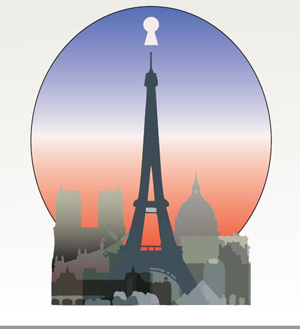Course Highlights
Unlocking Paris gives Western students keys to the city
 “We wanted to open the course to a broad group of students, and make it as accessible as possible,” says Christine Roulston. “Paris has a hold on global cultural imagination.”
“We wanted to open the course to a broad group of students, and make it as accessible as possible,” says Christine Roulston. “Paris has a hold on global cultural imagination.”
Paris is a city fashioned by history and culture, and carved by politics and revolution. Her massive cathedrals, grand boulevards, and tiny roadside cafés continue to romance historians, musicians, philosophers, artists, and yes, honeymooners. Short of visiting her, how could one possibly capture the city’s magic?
Starting in Winter 2021, Western University students will be able to roam Parisian streets, while sitting in London, Ontario. Unlocking Paris, a Department of French Studies first-year undergraduate course (French 1001B), begins next January. It is open to all Western undergraduate students, and has no prerequisites. The course will be taught in English – perfect for those interested in French culture and history, but unsure about learning the language. “We wanted to open the course to a broad group of students, and make it as accessible as possible,” says course developer and French Studies, and Women’s Studies and Feminist Research professor Christine Roulston. “Paris has a hold on global cultural imagination.”
Unlocking Paris is opening the doors of a city that has played an important part in defining the world’s arts, culture, history, and politics for centuries, to a new generation of Western students. “The course will take students on a journey through this quasi-mythical global city, asking what makes Paris ‘Paris’, and why it has attracted admirers and imitators from across the world,” she says. “It examines the city from multiple perspectives, from its seventeenth-century reputation as the first modern city to its current role as the city of fashion.”
Here is a sample Unlocking Paris à la carte menu – protests and revolutions from the seventeenth century to the present, architecture from medieval Notre-Dame to modernist Pompidou, the city as a historically stellar example of urban planning, racism against minorities and ethnic groups, political singer-songwriter traditions, fashion, LGBTQ+ and women’s rights.
Roulston is definitely talking about Paris’ beloved cafés, tucked across city streets and outskirts. These were melting pots of social classes in Paris – at any given time, prostitutes, high-end government officials, writers, philosophers, painters, and musicians would be rubbing shoulders, engaged in frivolity, and also, in the highest calibre of human thought. But cafés eventually became one of the main centres of a breakthrough period for human rights in 18th century France. Amidst espresso sips and cigarette puffs, Voltaire, Rousseau, and Diderot were writing against slavery, compiling encyclopaedias, and arguing for religious reform. Voltaire’s frequent café haunt, Procope, exists to this day. These lively, passionate, and important intellectual discussions spilled from cafés, theatres, art galleries and bookshops into the streets of Paris, defining global movements like Impressionism, Existentialism, and Enlightenment.
The French revolution of 1789, for example, transformed French society, and began the conversation about democracy, whose ideas quickly spread to mainland Europe. “Paris has always had a historically strong tradition of public intellectual culture,” Roulston says. “The average French citizen is aware of and has firm opinions on the country’s politics and economics.” But the city also has its flaws. “Paris has never successfully integrated its ethnic groups,” Roulston says. “Since France perceived itself as having the more civilized 'universal' culture, it has had problems with its minority populations.” For example, when people from former French colonies - Berbers, Blacks, Arabs - started to immigrate to France in 1960s, they were quickly ghettoized on the edges of major cities including Paris. Decades of poor education opportunities and high unemployment rates led to riots in 1995 and 2014.
But there is more to Roulston’s enthusiasm for unlocking one of the world’s greatest cities. Enrolments are dropping in French Studies departments across English-speaking Canada. “Students, in general, are reading less,” Roulston says. “The literacy culture now is not the same as it was, say, 15 years ago.” French Studies courses are typically literature-based. Many students want to learn French but not necessarily study French literature. An introductory course like Unlocking Paris could potentially reverse the trend. Could seeing France through the keyhole of Paris get students to step inside a full undergraduate French Studies degree in French? Roulston certainly hopes so.
French Studies is Western’s only department teaching exclusively in French, with the exception of Unlocking Paris. And yes, the undergraduate degree does help in the current job market. Students get an immediate advantage when applying for Federal government jobs, most of which require bilingual employees. Provincially, Ontario faces a massive shortage of French teachers. By combining their French Studies degree with an additional degree in Teaching, Western undergraduates automatically get a leg-up.
The French Studies department straddles three different literary worlds – French, Quebecois, and Francophone literature (largely West African literature and work from former French colonies like Algeria and Senegal). “If this course is successful, we would love to add another English language course covering Quebecois and Francophone culture, history, and literature,” Roulston says.





